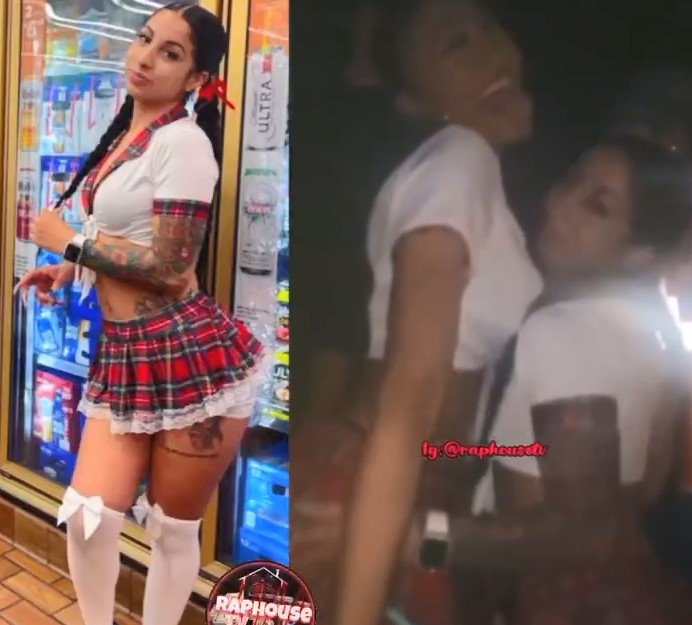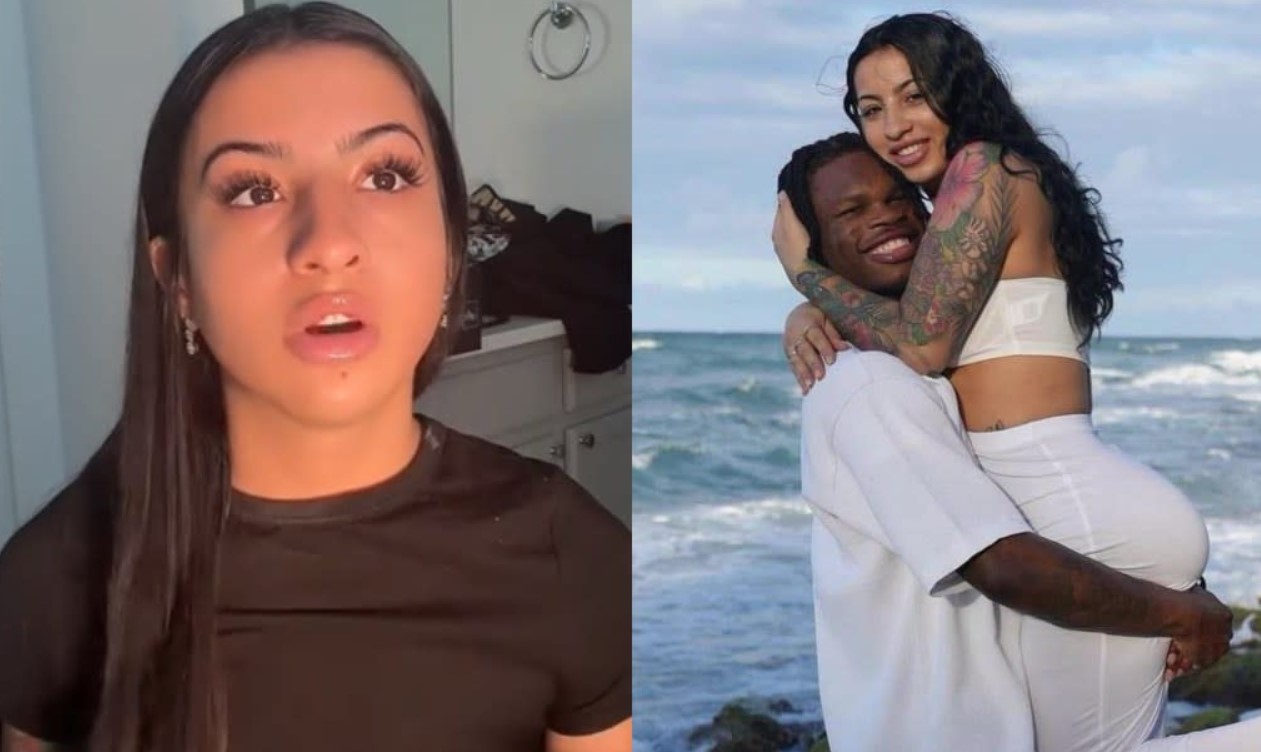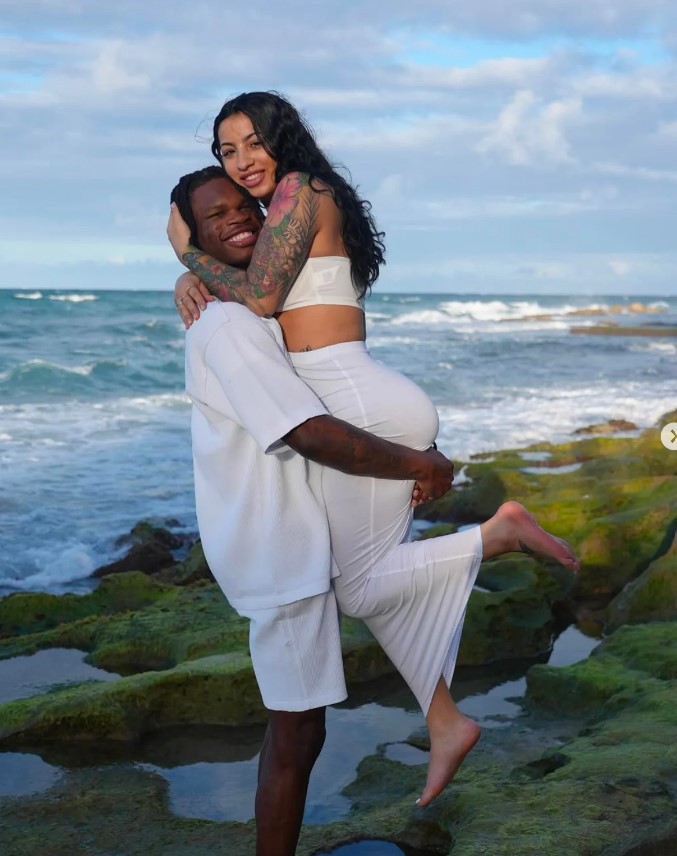Travis Hunter, a notable figure in the NFL, has recently been at the center of media attention not for his athletic prowess but due to the actions of his girlfriend, Leanna Lenee. The couple has been thrust into the limelight following a viral video that has sparked significant controversy and backlash from fans and the public alike.


Leanna Lenee, known for her close association with Hunter, became a subject of intense scrutiny after a video surfaced online showcasing her in a light that many fans deemed inappropriate. The video, which quickly spread across social media platforms, features Lenee engaging in behavior that many criticized for being unbecoming of someone in her position. The focal point of the controversy is a tattoo of a dollar sign on her ring finger, which has been interpreted by some as a distasteful choice, especially for what many consider a symbol of commitment and union like the wedding ring finger.
The backlash was swift and unforgiving, with numerous fans expressing their disapproval on various social platforms. Critics argue that the tattoo and her actions in the video reflect poorly not only on herself but also on Hunter, potentially affecting his public image and personal life. This incident has reignited debates about the boundaries of privacy for public figures and the impact of their personal lives on their professional careers.
As Hunter and Lenee navigate through this storm of public scrutiny, the situation underscores the often harsh reality of living in the public eye, where a single moment captured on video can lead to widespread judgment and criticism. This episode serves as a reminder of the pervasive power of social media and its ability to influence perceptions and spark controversy in today’s digital age.
The Origin of the Backlash and Video
The viral video that catapulted Leanna Lenee into the center of a heated backlash features her at a seemingly casual gathering, yet it’s her specific action that sparked controversy a tattoo prominently displayed on her ring finger, shaped like a dollar sign (“$”). This tattoo, typically where a wedding band might be worn, was perceived by many as a tasteless choice, especially given the traditional symbolism associated with the ring finger. The public’s reaction was swift, with the video spreading rapidly across platforms like Twitter and Instagram, where users voiced their disapproval and concern about the implications of such a symbol in a place traditionally reserved for symbols of love and commitment.
Critics on social media were quick to interpret the tattoo as a sign of materialism, questioning Lenee’s values and her influence on Hunter. Fans and spectators debated the appropriateness of her actions, with some suggesting that the tattoo was a poor reflection on Hunter as well, affecting his image as a respected NFL player. The intensity of the scrutiny was magnified by the personal nature of the display, leading to a broader conversation about the boundaries of personal expression versus public perception.
Previous Controversies
Leanna Lenee has not been a stranger to public scrutiny. Prior to the latest uproar, she was involved in other incidents that had already put her under the public’s watchful eye. A notable instance involved a video shared by Akademiks TV on X, where she was seen twerking with an unidentified man. This video raised eyebrows as it portrayed her in a light inconsistent with the expected demeanor of someone in her position, leading to disappointment among Hunter’s fans who expected a different public persona.


Furthermore, Lenee’s past resurfaced with mentions of her appearance in an old music video alongside a former boyfriend, which some fans dug up as evidence of a pattern of behavior they found questionable. Each controversy added layers to the public’s perception of Lenee, complicating her image and the way she is viewed by the public and Hunter’s fanbase.
Recent Events Adding to the Controversy
The controversies surrounding Leanna Lenee peaked during significant public appearances. At the Heisman Trophy ceremony, an event watched by millions, Lenee’s demeanor was closely scrutinized. While Hunter received accolades, Lenee was filmed sitting impassively, a reaction that many interpreted as unsupportive or disinterested. Her lack of visible enthusiasm during such a pivotal moment in Hunter’s career added fuel to the fire, with fans expressing disappointment over her apparent lack of support.
A second video compounded the issue when it captured Lenee appearing impatient and awkward as Hunter interacted with his fans. Her discomfort was palpable, and her behavior was seen as not just a personal reaction but as a reflection on Hunter as well. The situation escalated when, during a game, Hunter was seen speaking to cheerleaders, an interaction to which Lenee visibly reacted poorly. This incident was particularly controversial, as it suggested jealousy or possessiveness, traits that fans felt could undermine Hunter’s focus and professionalism.
Each of these incidents has been dissected by the public and media alike, highlighting the delicate balance public figures must maintain in their personal actions and public interactions. Lenee’s actions, captured and shared across social media, have sparked discussions about privacy, behavior, and the impact of personal relationships on professional life in the age of viral media.
Travis Hunter’s Response
In the face of escalating criticism towards his girlfriend, Leanna Lenee, NFL star Travis Hunter took to a live stream on Twitch to address the controversy directly. During this broadcast, Hunter passionately defended Lenee, emphasizing her loyalty and the duration of their relationship, which spans over five years. He expressed frustration with the public’s fixation on his personal life, particularly the negative attention directed at Lenee. Hunter implored his fans and the media to respect their privacy, highlighting the undue stress that public scrutiny places on personal relationships.


Hunter’s remarks also touched on the broader issue of social media toxicity. He criticized what he described as “clickbait” culture—media outlets and social platforms that exacerbate controversies for traffic and entertainment value. His defense was not just a plea for understanding but a stern warning against the dangers of perpetuating baseless narratives that invade personal privacy and foster negativity.
Impact on Personal Lives
The repercussions of the viral video and the subsequent backlash have been profound for both Travis Hunter and Leanna Lenee. The continuous public scrutiny has affected their daily lives, leading to significant stress and anxiety. In response to the unrelenting negativity, Hunter made the decision to deactivate his Instagram account—a move that underscores the severity of the impact on his mental well-being. This decision was aimed at insulating himself and Lenee from the harmful effects of online harassment and to reclaim some semblance of normalcy in their personal lives.
The situation has also sparked a conversation about the boundaries of celebrity and athlete privacy. Hunter and Lenee’s experience is a stark reminder of how quickly public perception can turn and how deeply it can affect those involved. Their struggle to maintain a normal relationship amidst such scrutiny has highlighted the challenges faced by public figures in managing their public and private personas.
The controversy surrounding Travis Hunter and Leanna Lenee serves as a poignant case study on the impact of social media and public scrutiny on personal relationships and mental health. This episode has demonstrated the powerful role that social media plays in shaping public narratives and how quickly it can amplify personal moments into public spectacles. It raises important questions about the boundaries of privacy for individuals in the spotlight and the responsibilities of the public and media in respecting these boundaries.
As we reflect on this situation, it becomes evident that there is a critical need for a more empathetic approach towards public figures and their personal lives. The public and media alike must consider the human aspect behind the headlines and strive to foster a culture that prioritizes compassion over curiosity. Ultimately, the health and well-being of individuals should be respected, regardless of their public status. This case advocates for a shift in how we engage with and respond to the personal lives of those in the public eye, urging a move towards more responsible and humane media consumption and interaction.
Daily Hot News –



